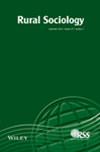“Can I Speak to the Bossman?” Sources of Stress, Behavioral Adaptations, and Role Incongruency in Female Farmers☆
IF 1.9
3区 社会学
Q2 SOCIOLOGY
引用次数: 0
Abstract
Traditional gender expectations and societal norms, along with unique occupational and organizational policies, may make it difficult for women to work in the agricultural industry. The purpose of this study is to apply“我能和博斯曼说话吗?”女性农民的压力来源、行为适应和角色不一致☆
传统的性别期望和社会规范,以及独特的职业和组织政策,可能使妇女难以在农业行业工作。本研究的目的是将角色一致性理论应用于女性农民的职业压力体验,并探讨在传统性别规范更为突出的地区,女性农民在男性主导的职业中应对工作的行为适应。对16名女性农场主和管理者进行了结构化访谈,并采用主题分析方法分析数据。女性农民报告的压力与性别刻板印象、厌女症、角色期望和缺乏尊重有关。这项研究发现,女性被认为与男性主导的农业部门不一致,并且经历了偏见和骚扰,证实了角色一致性理论。此外,参与者报告了行为适应,如采用男性特征,不同的穿着,过度工作或过度补偿,这些可能会导致更高的压力水平。参与这项研究的女性为在男性主导的职业中打破预期并取得成功而感到自豪,但应该付出更多努力来促进农业行业的多样性和包容性。
本文章由计算机程序翻译,如有差异,请以英文原文为准。
求助全文
约1分钟内获得全文
求助全文
来源期刊

RURAL SOCIOLOGY
SOCIOLOGY-
CiteScore
4.60
自引率
13.00%
发文量
47
期刊介绍:
A forum for cutting-edge research, Rural Sociology explores sociological and interdisciplinary approaches to emerging social issues and new approaches to recurring social issues affecting rural people and places. The journal is particularly interested in advancing sociological theory and welcomes the use of a wide range of social science methodologies. Manuscripts that use a sociological perspective to address the effects of local and global systems on rural people and places, rural community revitalization, rural demographic changes, rural poverty, natural resource allocations, the environment, food and agricultural systems, and related topics from all regions of the world are welcome. Rural Sociology also accepts papers that significantly advance the measurement of key sociological concepts or provide well-documented critical analysis of one or more theories as these measures and analyses are related to rural sociology.
 求助内容:
求助内容: 应助结果提醒方式:
应助结果提醒方式:


